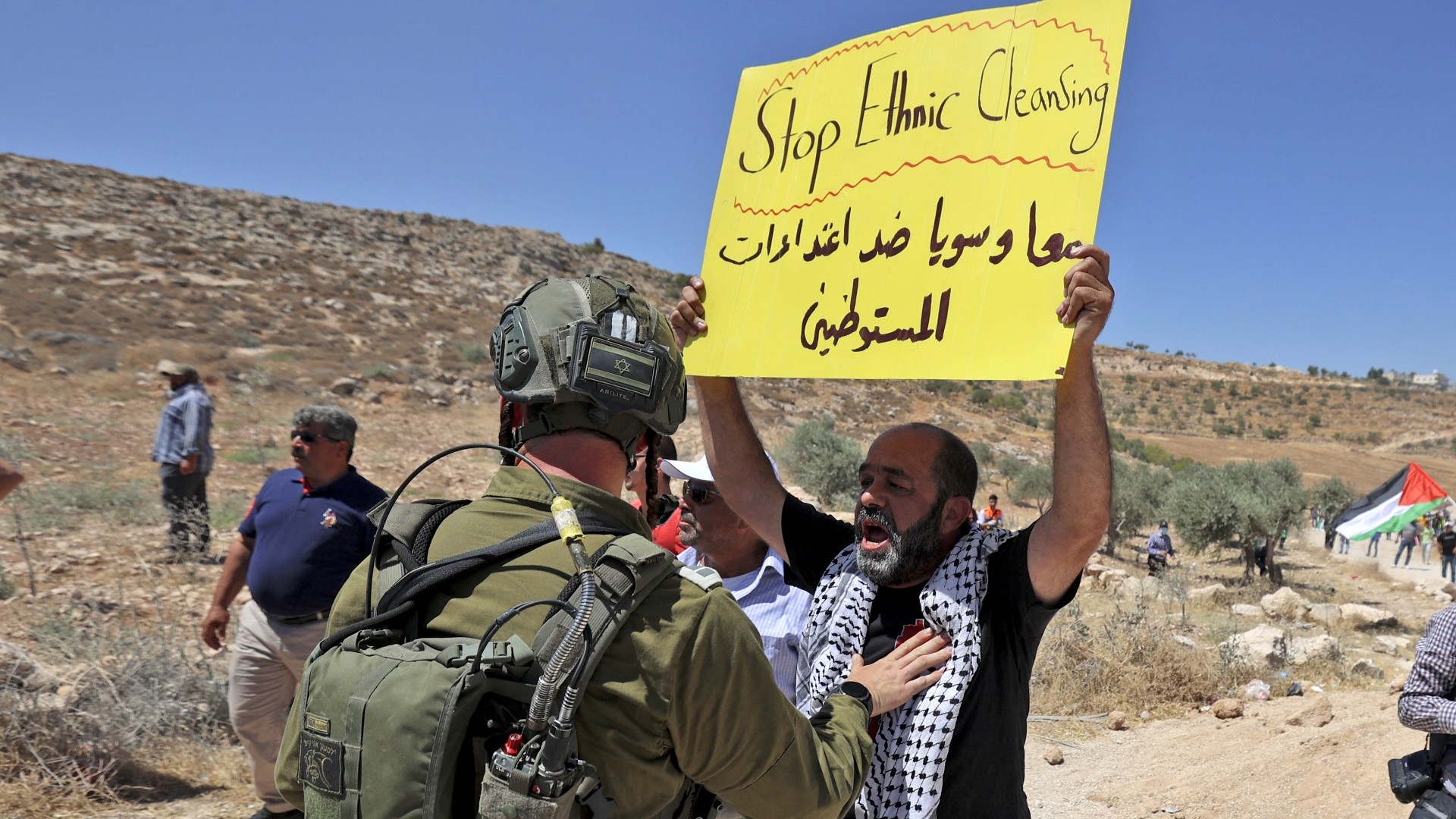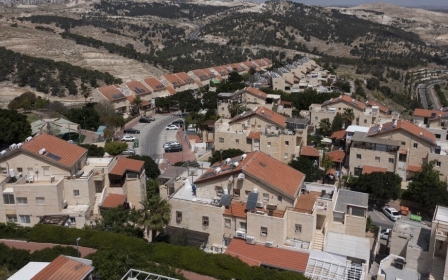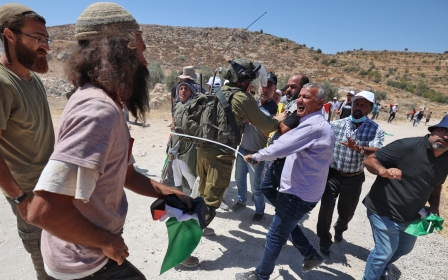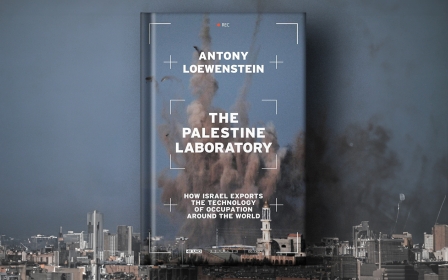Al-Mughayyir: Palestinian villagers still determined to fight attacks by Israeli settlers

Marzouq Abu Naim gazes out every day at the land that has long been part of his village, al-Mughayyir, northeast of Ramallah in the occupied West Bank.
It is agricultural land, planted with wheat and olives, tilled by Palestinian farmers - Abu Naim's own ancestors - for centuries.
But he says he is only allowed to access it for one day every year to harvest his crops. For the other 364 days he is forced to look from afar.
"We were raised to love the land, cultivate it and take care of it," Abu Naim, 65, told Middle East Eye. "For my father and my grandparents it was the most important thing because it was the source of their livelihood and life. But now it has been stolen from us."
According to villagers, more than 70 percent of the land in al-Mughayyir has been taken by the Israeli occupation, to be used as land for settlements illegal under international law.
New MEE newsletter: Jerusalem Dispatch
Sign up to get the latest insights and analysis on Israel-Palestine, alongside Turkey Unpacked and other MEE newsletters
That has placed the village in the line of fire of those settlements, and facing the regular closure of roads leading into the village.
The two main entrances to the village were closed for the majority of May and into June by Israel.
In an audio recording allegedly of an Israeli officer, the speaker says that the pretext for the closure of the roads was to stop stones and other projectiles from being thrown at Israeli cars. Residents described the closure as an attempt to collectively punish them for daring to confront continued settler attacks.
Abu Naim says that the closure of the roads has greatly affected the lives of the Palestinian residents, forcing students and workers traveling to and from the village to take unpaved roads, adding hours to their journeys.
"We have 36 teachers who come from outside the village to work in its schools. When the entrances were closed, we had to bring a minibus that would travel along the dirt road to transport them to the schools," Abu Naim said. "The journey took three hours instead of 10 minutes."
The eastern entrance to the village remains closed, with vehicles owned by Palestinians not even allowed to approach it.
MEE asked the Israeli defence ministry for comment but did receive a response by the time of publication.
The long hand of the settlers
In marked contrast to the restrictions imposed on Palestinian freedom of movement, residents of al-Mughayyir say Israeli settlers from the outpost Adei Ad, and others nearby, are able to attack Palestinian homes and agricultural land without any pushback.
The settlements were established on land belonging to al-Mughayyir several years ago.
According to al-Mughayyir's village council, 30 sq km of the village's 41 sq km of land have been seized by Israel since the 1970s, under various pretexts, including the establishment of a road exclusively for the use of Israeli settlers.
'We planted the land with wheat and now the Israeli occupation is preventing us from harvesting it'
- Marzouq Abu Naim, villager
"We have a lot of land behind the road that we are prevented from reaching," Abu Naim said. "We planted the land with wheat and now the Israeli occupation is preventing us from harvesting it. But they allow the settlers to burn it and steal our crops without any deterrence."
In May, settlers from the outposts gathered and attacked the village, burning several vehicles and assaulting residents who had tried to confront the attackers. Israeli soldiers arrested a number of the Palestinians, but none of the settlers, according to villagers.
The villagers of al-Mughayyir have become used to the attacks, which have taken place for decades. But they have increased in recent years, with the UN saying that this year there have been an average of three attacks by settlers per day, the highest since 2006. That is potentially because settlers feel increasingly emboldened as a result of Israel's far-right government, which includes several settlers.
Israeli settler groups have long openly called for the seizure of more Palestinian land for outposts, deemed illegal even under Israeli law, in an attempt to prevent Palestinians from building and expanding villages.
Amin Abu Aliya, the head of al-Mughayyir's village council, said that the village was one of the first areas in the occupied West Bank to have its land seized for the establishment of Israeli settlements in the 1970s.
Since the occupation of the West Bank in 1967, Israel has appropriated Palestinian land through various methods, such as seizing land for self-professed military purposes, manipulation of old records to claim that land was now Israeli 'state land', and the seizure of land deemed to have been abandoned by refugees, who are not permitted by Israel to return.
On 28 May, 17-year-old Muhammad Abu Aliya was a victim of a settler attack. Sat in a car with friends near the eastern entrance to the village, Muhammad says they were attacked by a group of settlers. When they tried to flee, they say they were fired at by Israeli soldiers stationed at the entrance.
"We were just in the eastern area of the village and the soldiers started shooting at us," Muhammad said. "It's an area subject to a lot of attacks from settlers, and soldiers provide them with full protection and attack us if we defend our village."
Muhammad and a friend were shot in the incident, while another friend was arrested after falling out of the vehicle during the shooting. Muhammad himself was transferred to a medical centre.
"I was hit by four bullets - one that penetrated my back and exited my chest, the second in my pelvis, and two in my legs,” Muhammad said. "I stayed in intensive care for two days, then my health improved... I seriously thought I was going to die."
Muhammad, still in hospital, says he has been threatened with arrest upon his release.
Mass arrests
On 5 June, around a week after the attack described by Muhammad, 55-year-old Rabiaa Abu Naim, Marzouq Abu Naim's sister-in-law, woke up to the sound of the door of her house being slammed open. She immediately knew that Israeli soldiers were entering her home.
Rabiaa said the soldiers destroyed the contents of the house, rummaging through clothes and overturning furniture under the pretext of searching the property. They asked after her youngest son, who was accused of being the driver of the vehicle that transported Muhammad to hospital. He was not in the house, so they arrested another son instead, a tactic often used to pressure wanted Palestinians to hand themselves in.
"There were dozens of them storming the house with apparent barbarism," Rabiaa said. "When I told them that my son wasn't here, they shouted at me, pushed me back and then arrested my other son. After several hours, they released him and sent a threat to his brother that he would be arrested as soon as possible."
According to the village council, more than 45 people from al-Mughayyir have been arrested in less than a month, including a woman and her son, and fathers with their children, with the aim of pressuring them to stop confronting settler attacks.
According to Amin Abu Aliya, most of the detainees have been released after paying fines, under the threat of re-arrest. But others have spent years in prison for their actions defending the village.
But that hasn't stopped villagers from trying - in any way they can - to hold onto their land.
"The people [of the village] gather and try to confront the settlers [when they attack]," Amin explained. "They transport the wounded in their own vehicles because ambulances are obstructed. And when the settlers start burning agricultural crops, every person in the village carries water to put the fires out."
"All of the villagers have turned into a beehive, joining hands together in the face of this permanent danger," he added. "They're trying to preserve what is left of their land and prevent more of it from being confiscated."
Middle East Eye delivers independent and unrivalled coverage and analysis of the Middle East, North Africa and beyond. To learn more about republishing this content and the associated fees, please fill out this form. More about MEE can be found here.






